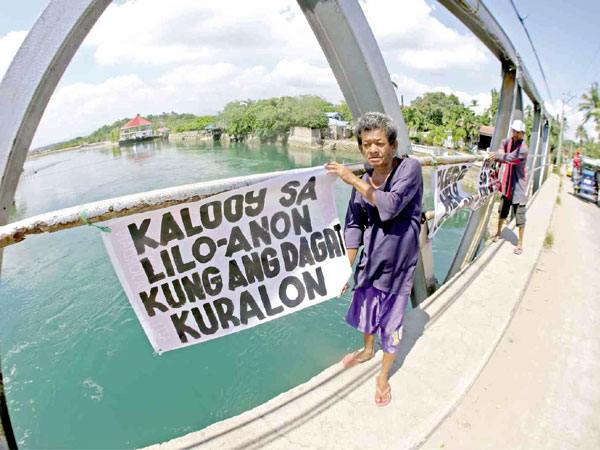
A RESIDENT of Liloan displays a banner pleading for help as a resort fences off a bay that has become the source of livelihood for fishermen in the town. LITO TECSON/CEBU DAILY NEWS
CEBU CITY—Residents of a town in Cebu are questioning what appeared to be the grant of ownership of a bay to a resort owned by the head of one of the country’s biggest labor unions which had fenced off portions of the bay, keeping fishermen away from their source of livelihood.
The resort, called Papa Kit’s Marine and Fishing Lagoon, is owned by lawyer Democrito Mendoza Sr., head of the Associated Labor Union-Trade Union Congress of the Philippines (ALU-TUCP), fenced off Silot Bay in Liloan town in Cebu province.
“Silot Bay is where our town, Liloan, got its name, because the current in the bay is like lilo (whirlpool). So this bay should belong to the people and not to a private resort,” said Elvira Aranias, a town resident.
Aranias said that they took photos of the fencing of Silot Bay, which started last month. Among the photos she showed to the Inquirer is of a security guard holding a rifle while watching over the workers putting up the fence.
Silot Bay is located between Barangay (village) Catarman and Barangay Poblacion. A bridge over Silot Bay connects the two barangays. Several beach resorts surround the area.
Aranias claimed that since the area was fenced, the residents could no longer take a swim or fish in Silot Bay.
“In the past, every Sunday, residents in Liloan would gather in Silot Bay to swim and fish. But now, we can no longer do it, because a security guard will shoot you if you do,” said Claudia Maranan, one of the residents.
But Art Barrit, the spokesperson for the Mendoza family, said that they were not fencing Silot Bay but only putting a demarcation line to mark the boundaries of their property.
Barrit said that the residents were not barred from taking a swim or going fishing in the area.
The security guard assigned to the area is there not only to guard the property but also to help keep the people safe from harm, he said.
Barrit added that there were instances when Papa Kit’s workers were able to rescue people from drowning in the area.
He maintained that the family owned the 90-hectare bay, adding that the Supreme Court has awarded the property title to the Mendozas.
The Mendoza family went through the proper process starting in the 1960s, getting permits from the local government unit and the Department of Environment and Natural Resources, Barrit pointed out.
Based on Supreme Court records on the case, Mendoza filed an application for sales patent to purchase the property on Sept. 29, 1969.
On Aug. 17, 1970, then acting director of forestry Jose Viado had issued a certification releasing the said property as alienable or disposable for fishpond purposes only.
On Jan. 19, 1973, an auction for the property had pushed through although then Liloan Mayor Cesar Bugtai filed a letter-protest in the director of lands objecting to the proposed sale of the property.
In his letter submitted on
Jan. 18, 1973, Bugtai said the area was intended for development by the local government as a tourist attraction.
But the District Land Office of Cebu City went ahead with the auction sale and declared Mendoza Sr., who was the sole bidder, as the winner. The 93.38-hectare property was awarded to the Mendozas at the price of P200 per hectare or a total amount of P18,477.62.
The dead dictator Ferdinand Marcos approved the recommendation for the approval of Mendoza’s sales patent application in May 1974.
Democrito Mendoza Sr. and his children, Gwendolyn, Vilma and Democrito Jr., were then granted the sales patents for the 90-hectare property that was registered in the Registry of Deeds which, in turn, issued original certificates of title to the four.
However, following a protest filed by a group of fishermen-residents of Liloan sometime in 1988, the DENR found alleged irregularities in the issuance of sales patents to the Mendozas.